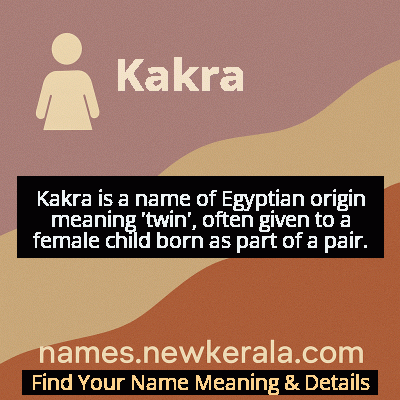Kakra Name Meaning & Details
Origin, Popularity, Numerology Analysis & Name Meaning of Kakra
Discover the origin, meaning, and cultural significance of the name KAKRA. Delve into its historical roots and explore the lasting impact it has had on communities and traditions.
Name
Kakra
Gender
Female
Origin
Egyptian
Lucky Number
6
Meaning of the Name - Kakra
Kakra is a name of Egyptian origin meaning 'twin', often given to a female child born as part of a pair.
Kakra - Complete Numerology Analysis
Your Numerology Number
Based on Pythagorean Numerology System
Ruling Planet
Venus
Positive Nature
Harmonious, responsible, caring, and artistic.
Negative Traits
Overly idealistic, superficial, possessive, or jealous.
Lucky Colours
Pink, turquoise.
Lucky Days
Friday.
Lucky Stones
Diamond, turquoise.
Harmony Numbers
2, 3, 9.
Best Suited Professions
Artists, musicians, teachers, healthcare workers.
What People Like About You
Warmth, nurturing nature, artistic flair.
Famous People Named Kakra
Kakra Baiden
Traditional Birth Attendant
Renowned for delivering over 500 sets of twins in Ghana while preserving traditional birthing practices
Kakra Amponsem
Cultural Preservationist
Founded the Ghana Twin Heritage Project documenting twin traditions across West Africa
Kakra Addo
Fashion Designer
International designer known for twin-inspired collections celebrating African textile traditions
Name Variations & International Equivalents
Click on blue names to explore their detailed meanings. Gray names with will be available soon.
Cultural & Historical Significance
Historically, twins in Akan culture were believed to possess special powers and required specific rituals and care. Families with twins often consulted traditional priests for guidance on proper upbringing. The name Kakra not only identifies birth order but also carries expectations about personality and role within the family structure. In contemporary times, while some traditional beliefs have evolved, the name continues to honor cultural heritage and maintain connections to ancestral naming practices that have been preserved for generations.
The cultural significance extends beyond mere identification to encompass spiritual and social dimensions. In traditional Akan belief systems, twins were thought to have connections to the spirit world, and specific rituals were developed to honor and protect them. The naming ceremony for twins involved special prayers and offerings, recognizing their unique status in the community. Even today, the name Kakra serves as a cultural marker that immediately identifies the bearer's birth position and connects them to centuries of tradition.
Extended Personality Analysis
Individuals named Kakra are often perceived as adaptable, observant, and possessing strong relational intelligence. Having been named as the 'younger twin,' they typically develop excellent social skills and the ability to read situations and people effectively. Many Kakras demonstrate natural empathy and understanding, possibly stemming from their inherent position of having to navigate relationships with their older twin sibling from birth. This often results in individuals who are diplomatic, cooperative, and skilled at building bridges between different people or groups.
Kakras frequently exhibit complementary personality traits to their older twin counterparts, showing creativity where their sibling might demonstrate practicality, or bringing emotional depth to situations requiring sensitivity. They tend to be excellent team players who understand the dynamics of partnership and collaboration. While they may sometimes be perceived as following rather than leading, this underestimates their significant influence in group settings. Their strength often lies in their ability to support, enhance, and complete rather than initiate, making them invaluable in both personal and professional relationships where balance and harmony are essential.
These personality characteristics often manifest as strong intuitive abilities, patience in complex situations, and a natural talent for mediation. Kakras typically excel in roles that require understanding multiple perspectives and finding common ground. They often develop a distinctive form of leadership that operates through influence and relationship-building rather than authority or dominance. The lifelong identity as 'the younger twin' shapes their approach to challenges, often making them particularly effective in supporting roles, creative partnerships, and situations requiring nuanced social understanding.
Modern Usage & Popularity
In contemporary usage, Kakra maintains its cultural roots while adapting to modern naming trends. The name remains predominantly used within Ghanaian and West African diaspora communities, particularly among families wanting to preserve Akan naming traditions. While not among the most common names in global databases, it has seen steady usage among families with twin births. Recent years have shown increased interest in traditional African names, leading to greater recognition of Kakra outside its cultural origins. The name appears in birth records primarily in Ghana, with growing instances in the United States, United Kingdom, and Canada among immigrant communities. Social media and global connectivity have helped raise awareness of the name's cultural significance, though it remains a distinctive choice rather than a mainstream option. The digital age has also seen the name appearing in online communities dedicated to African naming traditions, where parents share experiences and celebrate cultural heritage through naming practices.
Symbolic & Spiritual Meanings
Symbolically, Kakra represents complementarity, partnership, and the beauty of duality. The name embodies the concept that wholeness often comes through partnership and that different elements can create harmony when working together. It symbolizes the idea that being 'second' doesn't mean being secondary – rather, it represents completion and balance. In many African philosophical traditions, twins symbolize the unity of opposites and the interconnectedness of all things. Kakra specifically represents the receptive, adaptive, and completing aspect of this duality. The name carries metaphors of reflection, like the moon to the sun, or the yin to yang in Eastern philosophy. It suggests that true strength often lies in understanding one's position in relationship to others and embracing the unique contributions each position makes to the whole. This symbolic meaning extends to concepts of interdependence, mutual support, and the recognition that greatness often emerges not from solitary achievement but from collaborative excellence and complementary strengths working in concert.

